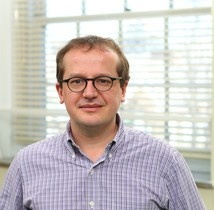Anders Hayden
Associate Professor / Honours Coordinator & Undergraduate Advisor

Email: anders.hayden@dal.ca
Phone: (902) 494-6602
Mailing Address:
- Critical perspectives on economic growth: politics of sufficiency
- Alternative measurements of prosperity and wellbeing ("Beyond GDP")
- Ecological modernization / green growth
- Sustainable consumption
- Environmental politics
- Politics of climate change
Education:
- McGill University (B.A.)
- York University (M.E.S)
- Boston College (Ph.D.)
Research Interests:
Dr. Hayden's research examines the social and political responses to climate change, and other environmental challenges. He is particularly interested in the evolving balance between efforts to promote ecological modernization (ŌĆ£green growthŌĆØ) and sufficiency-based challenges to the endless growth of production and consumption. He has written on efforts╠² to promote "green growth" in Canada, Britain, and the European Union. His interest in the sufficiency approach has included examination of policies and initiatives to reduce hours of work as well as research on Bhutan, a country that has established Gross National Happiness, rather than Gross National Product, as its overriding goal. He is currently involved in research on the political and policy impacts of alternative measures of wellbeing and prosperity (i.e. ŌĆ£beyond GDPŌĆØ measurement).
Profile:
Associate professor Anders Hayden is one of those rare few that grew up in Alberta and moved to Nova Scotia for a job. After completing a PhD╠² at Boston College, Dr. Hayden found himself returning to Canada and settling by the ocean when he was offered a position in the department of Political Science at ║┌┴Ž│į╣Ž═°.
Since he was an undergraduate student, Dr. Hayden has been interested in the political economy of environmental questions and has pursued those interests across disciplinary boundaries, completing a B.A. in Political Science, a MasterŌĆÖs degree in Environmental Studies, a PhD in Sociology, and then back into a Political Science department (with a cross-appointment in the College of Sustainability).
ŌĆ£That may look like a wandering path, but my interests have been relatively constant over time,ŌĆØ says Hayden. ŌĆ£IŌĆÖve simply found different disciplinary (and inter-disciplinary) homes to pursue them at various points in time.ŌĆØ
Dr. Hayden says that his favorite course to teach is his fourth-year course on the Politics of Climate Change (POLI 4380).
ŌĆ£ItŌĆÖs the course most closely related to my recent research examining the political and social responses to climate change, and the evolving battle between ideas of ŌĆśbusiness-as-usual,ŌĆÖ ŌĆśgreen growth,ŌĆÖ and ŌĆśsufficiencyŌĆÖ (which questions infinite production and consumption growth on environmental grounds),ŌĆØ he says. ŌĆ£ItŌĆÖs a very topical course, with opportunities to make links between the concepts weŌĆÖre studying and issues playing out in the news. The students who take it tend to be highly motivated and very interested in the subject matter, which makes it easy for me to teach. ItŌĆÖs a small upper-year class, with 12 to 20 students, so it provides an opportunity to have in-depth discussions at a high level.ŌĆØ
Dr. Hayden says that students should consider Political Science in their degree planning as there are excellent opportunities to combine Political Science with a major or minor in a wide range of other related areas, including: Environment, Sustainability, and Society; Economics; Management; Law and Society; History; International Development Studies; Sociology; etc.
ŌĆ£Studying Political Science is a great way to expand oneŌĆÖs horizons and learn about many of the key issues of our times, ranging from local politics to international relations, from promoting human rights to coping with political conflict. Political Science and other disciplines in the arts and social sciences provide students with skills in analysis and critical thinking, research, synthesis of information, and communication that can be applied in many different occupations. Our graduates have done very well with successful careers in a range of different areas: politics and government, public administration, law, business, the diplomatic service, international agencies, media, non-governmental organizations, etc.ŌĆØ
Selected Publications:
He is the author of two books: When Green Growth Is Not Enough: Climate Change, Ecological Modernization, and Sufficiency (McGill-QueenŌĆÖs University Press, 2014) and Sharing the Work, Sparing the Planet: Work Time, Consumption & Ecology (Zed Books / Between the Lines, 1999).
His articles have appeared in publications including Environmental Politics, Politics & Society, Journal of Environmental Policy and Planning, Journal of Environment and Development, Sustainability, Local Environment, Just Labour, and Alternatives Journal. ╠²
Service and Activity:
In the past, he has worked with non-governmental organizations involved in issues of human rights, a reduction and redistribution of work time, social justice, and international development.
╠²
